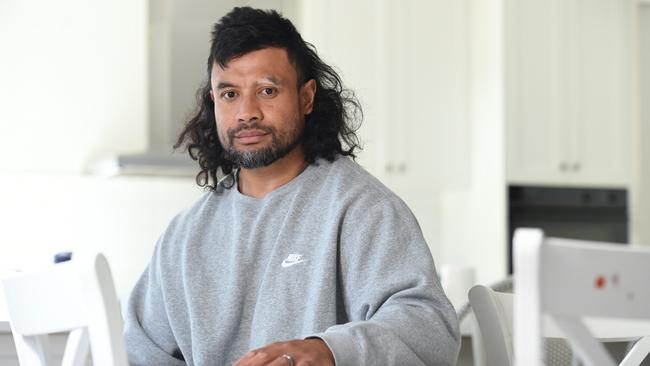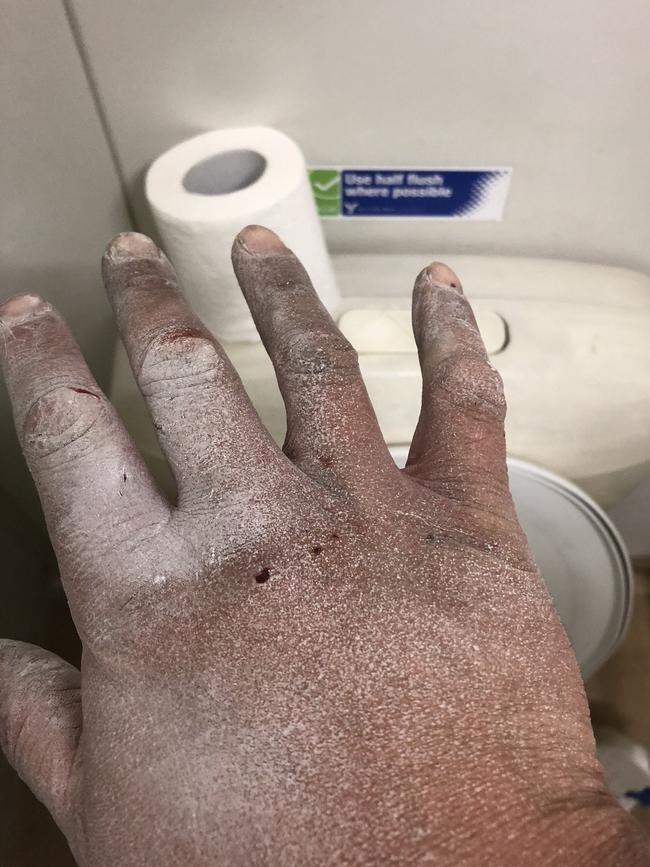Sick ex-stonemason Vilisunia Fakalata wins silicosis payout from five former employers
A former stonemason who was diagnosed with an incurable lung disease after inhaling silica dust for more than 20 years has been awarded a payout after he took five of his employers to court.

Victoria
Don't miss out on the headlines from Victoria. Followed categories will be added to My News.
Vilisunia Fakalata used to run 10km after work but is now short of breath walking up stairs.
For more than 20 years he worked as a stonemason, mostly cutting, grinding and polishing engineered stone, a popular product often found in kitchen bench tops in Australian homes.
But in 2019, the 44-year-old was diagnosed with silicosis, an incurable and progressive lung disease caused by inhaling silica dust which is released into the air when the product is cut.
Symptoms include shortness of breath, chest pain, tiredness and a harsh, dry cough.
There is no effective treatment for the often fatal disease.
“When I first started as a stonemason … I’d go for a 10k run, boxing training and weight training after work,” he said.
“Now I’m lucky if I walk ten minutes.”
Mr Fakalata is not alone.


The Lung Foundation of Australia estimated up to 600,000 Australian workers were exposed to silica dust in the workplace each year.
By May 2022, 579 workers in the engineered stone industry had been diagnosed with the disease including 175 Victorians — the majority under 35.
Mr Fakalata, who has been unable to work since his diagnosis, took five of his former employers to court and received a significant compensation payout.
He said he was not warned of the dangers of the disease and was offered minimal protection, likening one former workplace to a “death box”.
“I wish (I was warned) but I had no idea,” he said.
Between 2002 and 2013, he worked for TTI Stone in Thomastown where he estimated 60 per cent of his work involved engineered stone by the end of his tenure.
He wore a mask but said extraction fans were not installed until his final two years of employment.
“They were mounted up high and they didn’t really do much,” he said.

He also worked in another small factory in Thomastown for Acujet.
“I best describe the factory like a death box,” he said.
“There was dust everywhere, even in the offices.
“They simply had a fan blowing dust from one end of the factory to the other.”
Mr Fakalata developed a dry cough and shortness of breath in 2013 which worsened over time before a CT-scan revealed silicosis in 2019.
The disease contributed to the breakdown of his marriage and he now finds it difficult to play with his youngest sons, aged five and six.
Mr Fakalata said he wanted to return to the workforce but was limited by his condition.
“I have no idea what it is that I might be able to do,” he said.
“There is certainly no way that I am going to be able to earn the type of money I was earning as a stonemason.”


Last month, state and federal ministers agreed to ban engineered stone in the majority of jurisdictions this year.
Mr Fakalata welcomed the move but said it should have come sooner.
“I think it should’ve been banned years ago,” he said.
Arnold Thomas & Becker Managing Partner, Lee Flanagan, whose firm represented Mr Fakalata, said the settlement provided some justice for his client’s suffering and loss of earnings.
“Unfortunately, most stonemasons may not have been sufficiently warned by employers or manufacturers about the risk for silicosis, meaning they did not know they needed protective equipment to prevent the disease,” he said.
“We now know that there are clear links with a rise of silicosis in tradespeople and this knowledge has led to most Australian states and territories banning engineered stone.”
Mr Fakalata’s lawyer Maxine Radwan, from Arnold Thomas & Becker, said: “The health and wellbeing of workers is paramount. We welcome the ban on engineered stone and are pleased that we were able to provide our client with a settlement that enables him to focus on receiving the support and medical care needed.”
More Coverage
Originally published as Sick ex-stonemason Vilisunia Fakalata wins silicosis payout from five former employers





